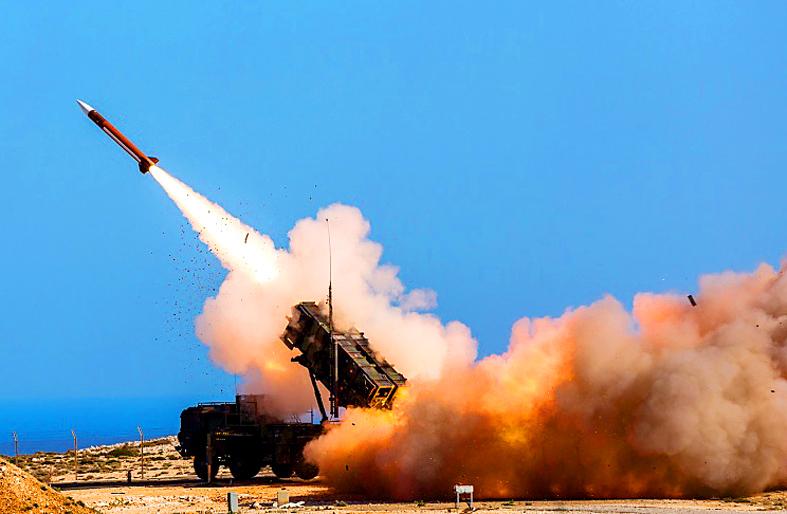The air force yesterday confirmed that it has requested the purchase of additional Patriot Advanced Capability-3 (PAC-3) Missile Segment Enhancement interceptors from the US to counter a growing Chinese threat to national security, while the Control Yuan sought corrections to the paperwork.
The missiles are to be delivered in 2025 or 2026, and be deployed by the end of 2026, the Ministry of National Defense said in a report to the Legislative Yuan.
Sources in the air force declined to comment on budget allocations for the missiles, or the number to be purchased.

Photo: AP
The report said that the request was made in 2019.
The missiles’ “revolutionary two-pulse solid rocket motor provides increased performance in both altitude and range while employing the same proven hit-to-kill,” said the Web site of Lockheed-Martin, which manufactures the weapons system. “The two-pulse solid rocket motor and enhanced airframe gives the interceptor more maneuverability against faster and more sophisticated tactical ballistic missiles and cruise missiles.”
Taiwan received its first PAC-2 systems in 1997, with upgrades to PAC-3 being implemented since 2007.
Taiwan has deployed more than 400 PAC-3 missiles.
However, the Control Yuan passed a motion to issue the ministry with a corrective measure notice, citing “faulty procedures” regarding the paperwork for the purchase of the missiles.
The military issues regular recertification requests to the US to keep its equipment up to date and well-maintained, the Control Yuan said, but added that the 2019 request for yesterday’s proposed purchase had not been signed by the minister of national defense.
The legislature only learned of the purchase proposal after it was approved for committee hearings at the US Congress, a Control Yuan report said, adding that it has issued the corrective measure notice so that it could oversee changes to administrative procedures for arms purchases.
Separately, the ministry also confirmed that the Chungshan Institute of Science and Technology has fulfilled its quota for this year of 23 Tien Kung (Skybow) 3 missiles.
The ministry had commissioned the institute to provide Skybow missiles yearly from 2015 to 2024, in a NT$74.83 billion (US$2.62 billion at the current exchange rate) contract.
President Tsai Ing-wen (蔡英文) in 2019 asked the institute to expedite production of the Tien Kung and Hsiung Feng missiles series without sacrificing quality.
Institute for National Defense and Security Research senior analyst Su Tzu-yun (蘇紫雲) told the Central News Agency that Skybow-3s have a higher intercept altitude than PAC-3s, although the PAC-3s have better precision.
The systems complement each other, Su said.

Auckland rang in 2026 with a downtown fireworks display launched from New Zealand’s tallest structure, Sky Tower, making it the first major city to greet the new year at a celebration dampened by rain, while crowds in Taipei braved the elements to watch Taipei 101’s display. South Pacific countries are the first to bid farewell to 2025. Clocks struck midnight in Auckland, with a population of 1.7 million, 18 hours before the famous ball was to drop in New York’s Times Square. The five-minute display involved 3,500 fireworks launched from the 240m Sky Tower. Smaller community events were canceled across New Zealand’s

The Ministry of Foreign Affairs (MOFA) yesterday said it is closely monitoring developments in Venezuela, and would continue to cooperate with democratic allies and work together for regional and global security, stability, and prosperity. The remarks came after the US on Saturday launched a series of airstrikes in Venezuela and kidnapped Venezuelan President Nicolas Maduro, who was later flown to New York along with his wife. The pair face US charges related to drug trafficking and alleged cooperation with gangs designated as terrorist organizations. Maduro has denied the allegations. The ministry said that it is closely monitoring the political and economic situation

‘SLICING METHOD’: In the event of a blockade, the China Coast Guard would intercept Taiwanese ships while its navy would seek to deter foreign intervention China’s military drills around Taiwan this week signaled potential strategies to cut the nation off from energy supplies and foreign military assistance, a US think tank report said. The Chinese People’s Liberation Army (PLA) conducted what it called “Justice Mission 2025” exercises from Monday to Tuesday in five maritime zones and airspace around Taiwan, calling them a warning to “Taiwanese independence” forces. In a report released on Wednesday, the Institute for the Study of War said the exercises effectively simulated blocking shipping routes to major port cities, including Kaohsiung, Keelung and Hualien. Taiwan would be highly vulnerable under such a blockade, because it

UNRELENTING: China attempted cyberattacks on Taiwan’s critical infrastructure 2.63 million times per day last year, up from 1.23 million in 2023, the NSB said China’s cyberarmy has long engaged in cyberattacks against Taiwan’s critical infrastructure, employing diverse and evolving tactics, the National Security Bureau (NSB) said yesterday, adding that cyberattacks on critical energy infrastructure last year increased 10-fold compared with the previous year. The NSB yesterday released a report titled Analysis on China’s Cyber Threats to Taiwan’s Critical Infrastructure in 2025, outlining the number of cyberattacks, major tactics and hacker groups. Taiwan’s national intelligence community identified a large number of cybersecurity incidents last year, the bureau said in a statement. China’s cyberarmy last year launched an average of 2.63 million intrusion attempts per day targeting Taiwan’s critical